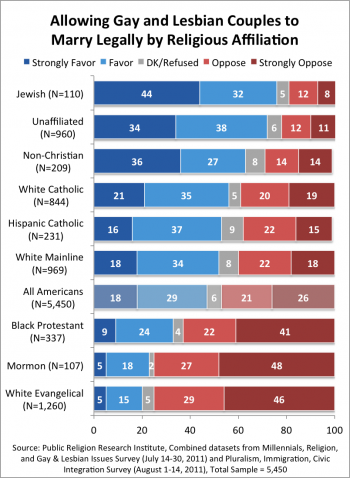In 2011, majorities of most religious groups favored allowing gay and lesbian couple to marry legally, illustrating that the old narrative of battle lines between secular supporters and religious opponents no longer serves as an accurate characterization of the landscape of the same-sex marriage debate. In the general population, 2011 was also the first year on record in which supporting same-sex marriage was not a minority position. In May, several surveys (all asking slightly different versions of the same question) found that a majority of the public supported allowing gay and lesbian couples to legally marry. PRRI’s May survey found that 51% of Americans were in favor, and 43% were opposed.

Five religious groups favor allowing gay and lesbian couples to marry legally, compared to three groups who are opposed.
Support is strongest among Jews (76%), the unaffiliated (72%), and non-Christian religiously affiliated Americans (63%), a group that includes Buddhists, Hindus, and Muslims. A majority of white Catholics (56%), Hispanic Catholics (53%), and white mainline Protestants (52%) also favor allowing gay and lesbian couples to marry.
On the other side of the debate are black Protestants, Mormons and white evangelical Protestants. Among black Protestants, only one-third support allowing gay and lesbian couples to marry, compared to 63% who are opposed. Mormons and white evangelical Protestants have nearly identical profiles on this issue. Only about 1-in 5 of Mormons (23%) and white evangelical Protestants (20%) support same-sex marriage, compared to three-quarters (75% each) who are opposed.
There are large generational differences between Millennials (age 18-29) and older Americans on the issue of same-sex marriage. Sixty-four percent of Millennials favor allowing gay and lesbian couples to marry, a rate that is more than 20 points higher than among those ages 30 and above (42%). This generational gap persists within every religious group, including more conservative religious groups. For example, 66% of Catholic Millennials favor allowing gay and lesbian couples to marry, 15 points higher than Catholics ages 30 and above (51%). Even among white evangelical Protestants—the group most opposed to same-sex marriage—nearly 4-in-10 (39%) white evangelical Protestant Millennials favor allowing gay and lesbian couples to marry legally, a rate that is more than 20 points higher than that of white evangelicals ages 30 and older (18%).
Source: Public Religion Research Institute, Combined datasets from Millennials, Religion, and Gay & Lesbian Issues Survey (July 14-30, 2011) and Pluralism, Immigration, Civic Integration Survey (August 1-14, 2011), Total Sample = 5,450.